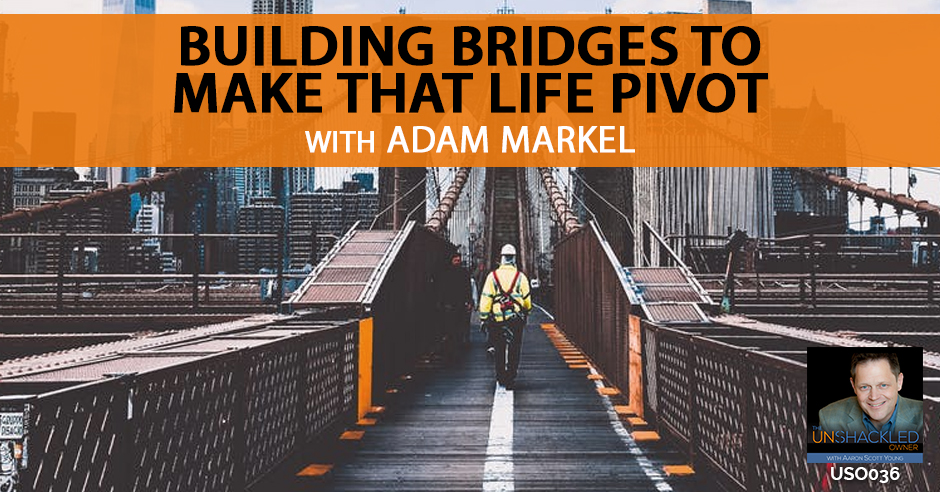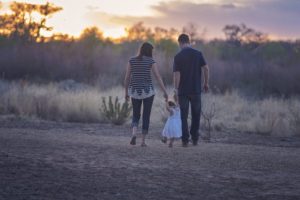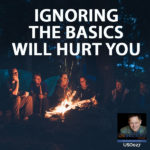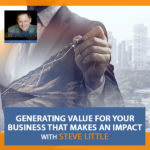 Our lives aren’t supposed to be static. We either aspire to be someone or aspire to be someone different. With teaching and counselling as the common denominators of his life, Adam Markel closed his law offices in New Jersey and Manhattan to experience a massive life pivot that connects business and spirituality. As a transformational speaker, Adam teaches people to acknowledge that tug in their hearts and be something more than just a lawyer, a doctor or a teacher. His best-selling book Pivot inspires people to wake up in the morning, be grateful and love their lives. Learn how the status quo leads to stagnation and why failure is not the enemy.
Our lives aren’t supposed to be static. We either aspire to be someone or aspire to be someone different. With teaching and counselling as the common denominators of his life, Adam Markel closed his law offices in New Jersey and Manhattan to experience a massive life pivot that connects business and spirituality. As a transformational speaker, Adam teaches people to acknowledge that tug in their hearts and be something more than just a lawyer, a doctor or a teacher. His best-selling book Pivot inspires people to wake up in the morning, be grateful and love their lives. Learn how the status quo leads to stagnation and why failure is not the enemy.
—
It’s so wonderful to be here again with you and to bring another great guest, another dear friend on to visit with you and talk about some of the ideas you need to understand, some of the processes, the tips, the hard-won lessons that will help you go from being the most critical employee inside of your business to really being an owner, to being a real unshackled owner. One that has a business that works harder for you than you have to work for it. That’s the goal of this program. If you’re looking for that, if that’s something you’re seeking, make sure you listen to the past episodes and subscribe and like this and rate it. I’d love to hear what your thoughts are. You can always reach out to me directly at Aaron@AaronScottYoung.com and share your ideas or your thoughts. I’d love to talk to you about that. The goal of doing this is to help you have a greater chance of building that successful company that’s going to be not only going be something that’s going to support you and your family but leave a legacy and make a real difference in your community. That’s what it means to be an unshackled owner.
Listen To The Episode Here
Building Bridges To Make That Life Pivot with Adam Markel
We’re back with a good friend of mine. I met Adam Markel about six or seven years ago. He was somebody who struck me immediately as a man of integrity, a guy who clearly loved his family. It’s hard because you go to live events, which is where we met, and you always get this shiny, varnished part of somebody. But Adam and I were able to have a conversation that very first time we met and we connected at a deep level, took away some of the varnish and just really talk about real things. You’re going to hear all about Adam’s story. Adam who is known worldwide as a tremendous leader and speaker and trainer is the founder of More Love Media and the author of the bestselling book and this really is a book that’s done well. It’s called Pivot. It’s such a timely name, pivot. You hear about that a lot but Adam’s book came out a year ago or something. He is a leader in this idea of pivoting and the subtitle I love, The Art and Science of Reinventing Your Career and Life. With that, Adam Markel, I’d like to welcome you to The Unshackled Owner. Nice to have you here.
Beautiful to be here. Thank you.
Adam, you and I are about the same age. We both have been married for a long time and you just had some big news. Your family is growing, is that right?
It’s growing by the minute it seems.
You’re starting to have that next level of family. Your daughter just became engaged?
Yeah. We’re blessed we have four kids and our oldest is 25 and has had a long-term boyfriend, a guy we love. He popped the question on Thanksgiving as we were gathering up for our gratitude circle, which we do in the backyard. We live in Southern California so having dinner outside on Thanksgiving has been a tradition for several years. My wife and I are married incidentally 28 years, so hopefully we’re a model. It’s way cool. He came to us about an hour before he said, “I’m ready to do it. Will you guys support me?” We said, “Of course.” He asked permission, we said yes, and so our family is growing.
Your daughter said yes?
We said yes, then our daughter said yes.
Congratulations. A lot of people know who you are and I just thought that’s a little bit bold of me to want to put it out here but I’m super excited for you. People know you from being up on platforms and stages all over the world but I want to go way, way back like back to DNA basically. If you don’t mind, let’s just ask a couple of quick questions about history. Where were you born and raised?
Born and raised in New York City actually. I asked my mom, she was just heading to the airport flying back to New York. I asked her, “Mom, where was I born? What hospital?” She told me we were living in Riverdale. Riverdale is the Bronx. It’s this little enclave in the Bronx that borders Westchester County. “We were living there and you were born at Mount Sinai Hospital,” which is in Upper Westside if I’m not mistaken. I was born in New York City and raised in New York. In fact, my parents ended up raising us in Bayside, Queens. I’m a kid from Queens. Grew up in an apartment and shared a room the size of a large broom closet. A small closet that got turned into a bedroom for my brother and I and stayed there until I went to college.
Where are you in the family? Are you the oldest, youngest, in the middle?
No, oldest of two. The closet we lived in can only fit two of us.
I do see a lot of entrepreneurs are the oldest child. I’ve always tried to figure that one out. I don’t know what it is, but it seems like oldest kids are often the entrepreneurial one in the family. My belief is that especially if you grew up like I did, where mom and dad didn’t have a lot of money and I don’t know what your circumstances were, but mom and dad didn’t have a lot of extra money to do stuff for us. As the oldest one, the little kids needed stuff and we had five kids in our family, I was like, “If I didn’t figure out how to make my own money, I was not going to have much.” Did you come from more affluence? What was your circumstance growing up?
My dad was a civil servant. He worked for the City of New York in Parks Department and was a preschool teacher. It was pretty amazing for that time in the world to be teaching four-year-olds. He was a writer. His passion was creative writing and he did that at night. My mom had a number of part-time jobs but mostly in the travel industry. We were never without food, never without clothes or things that we wanted. They were incredibly good to us but there wasn’t a lot of money; clearly not. We did wonderful things. We usually had these great vacations in the summer that we would drive up into New England and do that mostly because my mom was in a travel agency space. It could get discounts and all these things but we didn’t have a lot of money and it wasn’t modeled for us. In fact, the blueprint I grew up with was that money was not evil but definitely it’s like a selling out thing. That’s what I actually heard from my dad. It was a bit of a selling out.
If you had money, you had to have sold out or that money was just a burden, like a hassle?
Along the way, you just said sold out or it was the rich get richer and the poor get poorer and so there’s a thought around the rich being somehow responsible for the poor being poor or poorer and all that kind of have and have not stuff.

Building Bridges: There’s a thought around the rich being somehow responsible for the poor being poor or poorer.
This is what’s great about what we talk about in here, Adam, is when we hear stuff like this because people are growing up with these paradigms too, I love when somebody who has reached the level of success you have can say, “I grew up with this paradigm too or at least I was told this.” Did you resist it from the beginning? How did you deal with that kind of education from your two major role models, mom and dad?
I didn’t resist it. It’s ironic or maybe just fitting on another level that I end up empowering people in that space and have been training people in the money mindset and financial literacy space for a bunch of years now, almost eight years and had become a lawyer along the way. I was eighteen years in the practice of law before I decided to reinvent my career. Going back that far, I don’t think any of us questioned the programming. We’re not able to question the programming. We don’t know any better. The influence is on us and we see it. As we grew up, we either say, “I want to really be like them,” for whatever reasons on the subconscious or even a conscious level, like mom and dad or grandparents or any of the other big influences in your life or “I don’t want to be like them. I want to be the opposite,” and that kind of thing. In the more formative stages, the first seven or eight years is a bit more the emotional development side. Then we go into a mental development side that takes us through puberty when the physical development kicks in. It’s not until later that I think we consciously are choosing to follow or to rebel and I didn’t. I didn’t question those things until I got old enough to be questioning them and going at, “Is that what I want? Am I going for that and be aspired to be just like them or am I aspiring to be something completely different?”
For me, I rejected a lot of things in my early twenties when it just appeared to me that it wasn’t going to work for me. I met my wife in college. We decided almost out of the gate when we fell in love that we wanted to have a big family and we ultimately had four amazing healthy kids. I didn’t have a blueprint for how to support them financially or how to provide for them. The first thing I did was to follow the same pattern which was to go to school, try to get decent grades, get a decent job, make a decent living and at that time, I realized that wasn’t working. I went back to school became a lawyer because my instinct was, “If I get more training, I get a professional degree, I’ll get more money,” which is what I did.
Let’s rewind back a little bit though. When you were a kid in high school, after the several stages have been kicking on you through puberty, did you work when you were a kid? Did you have jobs? Was there something that you noticed that you are good at when you were young? Or something maybe in high school that you thought, “I’m pretty good at this thing.”
Not really, no. I had odd jobs and things like that. It was later in life, and this is where my own teaching and experience and then ultimately teaching the stuff comes into play. I didn’t. I just was playing the game the way it was being told to me to play, and I wasn’t playing it at my 100% because I didn’t completely buy into it. I wasn’t great at school. I didn’t like authority. I didn’t like being told what to do. I didn’t strive and kill myself to make good grades but I did all right and I did well enough to get into college and follow the basic breadcrumb trail that was out there, that was being shared and told to me.
I’ve only known you as somebody who’s a terrific presenter, a real heartfelt, heart-spaced kind of guy. You grew up in this situation and you were in this middle class family and money was somehow a sellout. Where did the Adam Markel that we see now start to show little signs of as a kid? I’m wondering, was it in a choir? Was it in playing sports? Was it in boy scouts? Was there any part of that growing up where you go, “I didn’t know it at that time but that instinct, the thing I fell naturally into started setting,” or maybe not, maybe it didn’t happen.
It did. I just didn’t notice it until I was 40 years old. That’s what I’m saying.
What was it?
It was the desire to help people, to counsel. I would give advice to my friends, to others. I was teaching on some level. One of my first jobs when I was still in my teens, at seventeen, I think I lied. I definitely think the statute of limitations has run so I can admit this. I lied on my job application to work at a summer camp as a tennis instructor. I was seventeen but I said I was eighteen and I just turned seventeen. What I love to do was this counseling, was this teaching. Ultimately after college, I got a job working as a junior high school English teacher in the City of New York because back then, and it may even still be the case, New York was so desperate for teachers. If you had a degree, it didn’t have to be an education degree, and I was an English major. They said, “You could teach language arts. You can teach English,” which I did for two years in middle school.

Building Bridges: I was afraid but not intimidated because I was able to continue to go forward and deal with the situation.
When I look back, the common denominators or the common elements were teaching, counseling, giving in a certain way that I’ve been doing now publicly for a number of years and that’s what was common. When I went into the practice of law, the only thing that I really enjoyed about it after about five years into it, it became drudgery and I almost hated it. What was a catalyst for my making a change was to really waking up each day, putting my feet on the floor and feeling anxiety and dread even about what was ahead, what the day was going to be because I didn’t love what I was doing. Even in that profession, what I loved was the counseling part; to counsel my clients and give them good advice about their life and what they were doing and why they were doing it. The settling of cases and the pursuit of things because I was a litigator, pursuing people’s rights and all that kind of thing, I could do that well. I learned how to fight in the school yard. I was bullied when I was younger because I was small. I learned how to deal with bullies and then ultimately when I was more empowered with the law, law degree and other things that I could take on big firms, which I often did. The big firms were representing the other side of my lawsuits often. I was afraid but not intimidated because I was able to continue to go forward and deal with the situation but that was not what I loved. What I loved was the counseling of my clients.
As we see so often, your super power, the thing that is your natural inherent gift or gifts, they emerge early on like you said, you were counseling your friends, you’re teaching, you love that idea of teaching, nurturing, and helping. These things happen but we ignore them. You said it took you until you’re 40 years old to understand that this is what you’re great at. I encourage everybody listening to really look and say, “What is it that people come to you for? What are you constantly being asked to do? Are you the one that is the counselor? Are you the one that can put together the complicated chest of drawers? Are you the one that’s the party planner? Are you the one that’s good with numbers? What is it?” Because the thing that you’re often ignoring is the precise thing that if you focus on it, not only would you be happier but you might very well make more money and have a bigger life.
When we understand what our super powers are or those things that we’re just naturally gifted at, if we know what those things are and we pursue them for good, not for evil because you might be a great convincer but you want to make sure you convince people for good things not bad things, that’s when you start to unshackle yourself. That’s when you really start to be the person you want to be. Adam, you said that even though you’d come out of this broom closet bedroom with the parents who had a negative attitude towards money, you’d gotten married to Randi who is a spitfire in her own right. You’re going forward, you’re going to raise a family, you got your law degree, you’re out there and you’re being a lawyer but most of it, you said after five years it was a drudgery because you weren’t getting to spend most of your time doing what you love to do. Is that where we left off?
Exactly.
I just think it’s important when we tell these stories, I like to go back and say, “Don’t forget, this is why we’re telling this.” You got into this. The five years you knew but you said you went eighteen years in the practice of law. What happened over those fifteen years that finally just wore you out?
My daily dose of pain and anxiousness.
Did you start doing something along the way while you were still practicing law to try to fill that void that you felt? Is that how got you involved with maybe personal development or with writing or with other kinds of counseling? What happened that was the beginning of going off on the fork in the road away from your legal career?
I had a couple of different catalysts. The pain was one. Waking up and feeling that way and looking in the mirror and not liking what I was seeing in return. I couldn’t blame the mirror. I can’t say, “It’s your fault.” If I had, it would be looking right at me of course and that was truth. It was my doing that I had been selling out. It’s ironic because ultimately I felt as though what I was doing for money was selling out because I didn’t love what I was doing. It didn’t feel good inside. I really believed it was eroding my soul but I didn’t even have a language for it at the time. I began reading. I read Dr. Scott Peck’s The Road Less Traveled. It was the first personal development books I suppose that I’d read. Then ultimately a friend of mine dragged me to a seminar, to a workshop. I’d never been to a seminar or training in my life before and I started to see glimpses that there could be a different road, a different path for me.
At a certain point somewhere in the vicinity of that, I had what felt like a near-death experience. I thought I was having a heart attack. I was driving at the time and pulled over to the side of the road, asked my wife to drive to the emergency room and we got there. I literally thought I was expiring and was not going to see my kids that afternoon when they came home from school. It was a devastatingly scary moment for Randi and I. When ultimately a doctor came into the room that they had me in and let me know that I wasn’t having a heart attack, I was having an anxiety attack brought on by too little sleep, too much stress, too much coffee, the usual stuff and too much misery frankly, internal misery, I left the hospital that day thanking God. I didn’t have those kinds of conversations. I didn’t converse with God very frequently at that point in my life and I felt so grateful that I was given this opportunity, the second chance because clearly, it could have gone different. The doctor even said he sees people come in and they don’t come out about my age and it might not be the same for me if I had to come back a second time. I took that really seriously.

Building Bridges: I just knew that money wasn’t the answer. That something else was going to drive the bus if I was doing it from the heart.
At that moment, I realized something had to change. My wife and I didn’t know what was going to change. I just knew I couldn’t keep doing the same thing and pretend the results were going to be different. Pretend that I would feel better about it if I just wait another year, two years or five years or whatever or get another million dollars in the bank and somehow it will be better. I made a lot of money. I had very successful entrepreneurial business, two multistate law practices and I owned a title insurance company and a number of other businesses and that kind of stuff, heavily invested real estate. I just knew that money wasn’t the answer. That something else was going to drive the bus if I was doing it from the heart. Thankfully, it was asking those questions that I didn’t have answers for, there weren’t easy answers that were readily Googleable and I couldn’t ask Google what I should do with my life or anything like that.
What questions were you asking yourself?
“What should I do with my life?”
You were miserable but you were doing everything that by the book you should have been doing. You’re building your company, you’re investing your money, you’re in a happy marriage, you’ve got beautiful children, all that stuff by the society standard should have been fine. You should have been grateful. You shouldn’t have been having a panic attack. What the hell is wrong with you? But it didn’t change your gut and your heart.
I was grateful. It wasn’t that I was lacking in appreciation or love for what I had except the material things. I just didn’t need another house or another car. I would have continued down that path anyway. We’re consumers; unfortunately, I think that’s the way we’ve all been called to be consumers. The fallacy or the trap door is in thinking that the outer world things, the trappings of the material world will solve or satisfy the hunger of the soul. For me, I clearly came to a place in my life where my soul’s hunger was not satisfied by more material or things outside of myself. Right then and there, I had an epiphany I guess. I had this awareness that I wanted something. I wanted to feel differently. I wanted to have a different experience of living than the one I was having and there wasn’t a belief in me that says, “This is the only thing you can do to feel good or to have what we’d call success.” That’s the thing about success anyway, there’s no one definition. Everybody has got their own definition. I think a lot of people get lured into other people’s definition of it and not even their definition so much as what they’re modeling. It’s really exacerbated in a lot of ways by social media and where we see a lot of people just partying and driving their fancy cars or their private jets or whatever it is. You’re thinking somehow that you’ll be happier, you’ll be healthier, you’ll be more close to God. Your soul will be satisfied if you just fly private. We all know that’s just a lot of BS.
I just heard Jim Carrey, the comedian and the actor, who’s become in a small way a personal development spokesperson and the quote said, “He wished that everybody could become rich and famous and have everything their heart ever desired just so they could realize that it doesn’t really mean anything,” and I said, “Isn’t that great?” That’s what you were experiencing. You started asking these questions, you started reading books, and you went to an event, you’ve started feeling a little tug. What was the moment where you said, “I’m going to close all the stuff down. I’m going to quit my legal practice, walk away from resell,” or whatever you did with your title company. Whatever it was that your empire was that you said, “I’m going to stop doing that and I’m going to start traveling the world speaking.” You had to pull that trigger somehow. Maybe it didn’t happen one day but my guess is you couldn’t have ridden both horses for a long time. There had to be a moment when you actually, as your book would say, pivoted.

Building Bridges: The fallacy or the trap door is in thinking that the outer world things, the trappings of the material world will solve or satisfy the hunger of the soul.
What’s really cool is that you’re using the ‘riding two horses’ analogy and I’ll speak about constructing two bridges. It’s the same analogy in a different form, which is cool. The bottom line here is this is the subject matter that I’ve been now blessed to write a book about that became a really wonderful tool and resource for a lot of people. It became a bestseller too and all that kind of thing. It’s enabled me to teach this topic of personal and professional reinvention in many places around the world and it’s a process. The process for me is not one of jumping ship. I had a jumping ship moment when one night that I’d come home from work, it was typical for me to get on the bus out of the city because I have a law practice in Manhattan and one in New Jersey. Our family was living in New Jersey. I get home usually after the kids had gone to bed and this was one of those nights. It was cold and rainy and miserable in New Jersey and I got home and missed the kids going to sleep because I like to read them a bedtime story and all that kind of thing. I wasn’t in their lives for most of the day because I got up in the dark and I got home in the dark like a lot of people. I’d miss them again and I walked in and I looked at my wife and I just said, “Baby, if I keep doing what I’m doing, you’re going to be a widow.”
That was a moment where it could have been a jump ship moment and, Randi and I, we talked about this and share these with folks because her response back to me was, “Baby, we’ll figure it out.” She didn’t say to me, “We’ve got a big mortgage. We’ve got houses, cars and things, you can’t jump ship. You can’t quit your job.” She said, “We’ll figure it out,” and what that figuring it out process became is this pivot process. Where over time we made small changes and over time those small changes turned into transformational opportunities that we could never have predicted and certainly never would have planned for at the time but they manifested when we began to change things.
What did you start to change?
One of the little things that we changed immediately was I wanted to speak. I wanted to teach and I had a facility for this. I didn’t know it. I’m an introvert by nature. People are shocked sometimes hearing me say that. It’s not like I have this need to be in front of people because I get energy from it. It’s quite the opposite. I realized that I had this capacity to connect with people from that platform whether it’s speaking one-on-one or one on ten or one on 10,000, which I’ve done in China and elsewhere and it doesn’t faze me. It only fazes me if I think about me and what it means to my ego to fail or succeed but I don’t typically do that. I come out there, I just love to open my heart and connect with people. I wanted to do that. I wasn’t going to be able to do that full-time at the beginning. I had this one bridge that was working which was my law practice and that paid for all the bills. It paid for everything in our life. I said, “Am I going to deconstruct that bridge and then what do we do from there?” Instead we said, “No. That’s doesn’t make sense. We better construct another bridge and that bridge will construct simultaneously with maintaining the bridge we’ve got. The one we know is not the bridge to forever or tomorrow even, but it will last as long as it has to last in order for that other bridge to get constructed and for us to learn what we need to learn and be able to reinvent on the fly in essence.” That’s like you said, riding two horses. You can’t do that forever and I didn’t.
About two and a half years after we started to construct this second bridge, which involved my getting out in public and speaking on some stages and thinking about writing a book and then putting to pen and to paper stuff and all the little things along the way, I closed down my law practice. I was winding it down. I would say I was right out of the gate; I was 95% law practice, 5% this passion. The passion pivot for me, that’s reinvention. Then it became 90-10 and then 80-20 and 70-30 and before we knew it, the tipping point came where I could see light at the end of the tunnel, that I would be closing down my law practice. As it turned out, I became a trainer for a particular company called Peak Potentials. I ultimately became a trainer for that company all over the world and then ultimately became one of the people that was involved in the purchase of the company and then ultimately the CEO of that company and that kind of thing. That happened over a period of three, four years and along that process, I closed down my other businesses. I sold my interest to partners. I wound down my affairs.

Building Bridges: We better construct another bridge and that bridge will construct simultaneously with maintaining the bridge we’ve got.
I had a one really telling moment at about three years in where I was closing my law practice in New Jersey. I had already closed my Manhattan practice. The one in New Jersey was where we had been keeping all the files and things and the shredding truck. I remember Randi had called the shredding truck. It came to my office and it sat outside my office for two whole days shredding the files that were old enough to be shredded, because you don’t have to keep them if they’re seven years or older. All of those files from my early career and all that kind of thing, it took two days to shred those files. I remember my office being vacant. Everything had been removed at that point. Only a few boxes left. I found myself just involuntarily hitting the floor, lying on my back and writhing in pain and hysterical crying, feeling just this loss of time. Ultimately, what I came to understand was that I hadn’t wasted any of my time. I hadn’t wasted those years of working in that profession, of learning the skills I learned because everything I’d learned was applicable and relevant in the life that I was creating and I was evolving into going forward. In the moment, it was just this grieving for the loss of time. What I was feeling was just, “Of all these years, I’ve wasted my time.” It was that fear of all that that I can see now could have kept me in that profession forever. As I’d seen so many colleagues that were 60, 70, 80 years old still practicing law and miserable, unhappy, real SOBs, and I just saw that as a road I did not want to end up on or stay on.
The magic here is that you didn’t stay until 50, 60, 70, 80. You acknowledged that tug, you acknowledged that there was something missing. Instead of saying, “That’s just life, whatever. That’s how it is,” you said, “I can do something about this.” You started to learn new skills. You started to go places you hadn’t gone like that first event. You started to go, “There’s a whole world out here I didn’t really know about,” and then you as appropriate, embraced it. When you’re out there and you’re suffering through stuff, and I know a lot of people that write to me that are working at a job, who have a W2 job and you’re like, “I know there’s more to life but I just don’t know what to do, or I’m not ready. I can’t make that jump.” Listen to what Adam Markel just taught you about. While you’re staying in the things that’s paying for your bills, instead of watching TV, instead of playing for the Softball League or whatever, if you really want to do something different, you have to take time away from something you’re giving your time away too now and start building that second bridge. That’s going to be your exit from the things that is the drudgery right now into hopefully, the life that you would dream of living. Or at least, as one of my favorite old books I read a long time ago, it’s called Failing Forward, at least if you’re building the second bridge, it may not give you the perfect life you want but it may be better than where you came from.
The great news is none of us have to be static in our life. As a matter of fact, it’s almost insane to think that you can be static in your life. Adam, what a phenomenal nugget right there of build two bridges. Work the one that’s paying the bills and start to build another one. I want to celebrate you in front of all these people and say you might have felt on that day on the floor in the empty law office that you had wasted time, but what you’d really maybe been doing is paying your dues so that you had enough story to tell that you could be a big influence on other people because you’d actually done something else and you had to make that. Let’s go back to the book. You had to make the pivot. You had the guts to make the pivot. Tell me about the book and about the movement and about the process and about what you want people to know about you. You decided to write that book for some reason. Tell us about that.
I want to go back, just leave another layer to what we’re talking about. A couple of things, first of all, I agree with your status quo and this is stuff that we use in the book, we talk about in the book. The status quo leads to stagnation and the problem with status quo is that it’s the cause of the training we received when we were very young and that training was to not make mistakes. I love what you referenced to Failing Forward because that’s the point. Failure is the enemy for most people but failure is not the enemy. Failure is actually a friend because it’s what enables you to learn what’s required to be able to advance. Without that learning, you cannot advance very far. Ultimately, you end up with a life that feels mediocre and is on some level mediocre. That’s where Henry David Thoreau’s old quote that, “Everywhere, people lead lives of quiet desperation,” is so relevant in our world today. Trying to not make mistakes is the same on some level as defending the status quo, defending stagnation. We all know when things stagnate, they get toxic and ultimately, things that stopped moving altogether die. It’s a road that goes from status quo, meaning not being willing to make mistakes to ultimately to death. That’s a sad thing to say.

Building Bridges: The problem with status quo is that it’s the cause of the training we received when we were very young and that training was to not make mistakes.
The three parts to the process that you are referring to, that we were discussing, and this is part of where meeting folks where they are is really important, that if you are having some of those feelings, whether it’s the feeling that maybe you’re not really doing what you’re here to do on the Earth, you’re not really passionate, you don’t wake up enthusiastic. Maybe you do have some anxiety or depression even or you have trouble sleeping at night or trouble staying asleep, other things that are showing in your life as symptoms that you’re not really purpose-driven and you don’t feel terribly passionate and all that kind of thing, that’s a great place to be in noticing, in awareness. There are three parts to the process: to notice it, to be aware of it, to embrace it, not to resist or to shoot the messenger so to speak. Embracing it, that’s part one. Part two is to embody it. Embodying it is trying it on, is doing little things that help you to embody what it would be like to make the change, whatever that change might be. Maybe it’s to become an artist or like my brother at a certain point who’s also lawyer, maybe he wanted to just broker art. Create a pop-up gallery. There are so many pivot stories that we showcase and those case studies are in the book as well. There are so many people that are pivoting right now. Pivoting into different careers, different jobs, side businesses, some referred to as a side hustle that kind of thing. The embodying is so important that you are trying those things on for size and seeing how they feel.
Then the third part, so it’s embrace, embody, and then take inspired action. There’s nothing that changes in any of our worlds without the action component of it. You don’t want to just chase after the shiny pennies, which is unfortunately what a lot of people do. Even in the personal development space, sometimes it’s promoted to see all these smorgasbord of opportunities and people start chasing after them when what we’re really looking for is inspiration, inspired actions. Embrace, embody, and then take inspired action. That’s really the essence of what pivot is about.
We break the book up into three sections. The first part is about what we started this conversation discussing, which is our belief systems. The beliefs create our mindset. Getting clear, which is the first step in any process of change, is to become more aware and become clear in order to create that clarity to clean the windshield, so to speak, so we can drive down the road of life with a clear windshield and be able to drive that much faster. We’ve got to identify what those beliefs are and what beliefs have created our results so far and kept us where we’re at and where some of those beliefs might inhibit us from moving forward unless we challenge them and maybe even un-believe certain things. The second part of the book is about getting into momentums, starting the action taking and that’s behavioral. What is it that creates our behaviors? What are the rituals, the practices, the habits, the things that we do that create action for us? How do we also in the process creating that action, create resilience so that we can adapt to the change around us and be able to utilize it to move forward and manifest something really new and really exciting and really in alignment with what our heart wants us to do?
These are some of the things that we cover in the book and it is a really powerful process. I love to use the word process. You’re a business guy and you’ve been teaching a lot of people through The Unshackled Owner work as well as through other work that you’ve been doing how it is that you can create a business and even be able to have that business run in a way that it doesn’t require you to be in the business but to be actually working on the business and then ultimately, maybe even selling the business. Those are incredible results that a lot of people don’t get because they’re poor on the process side. They’re poor on the system side. What I love about the book and what we teach in the area of reinvention is that it is a process and it’s foundational. You can’t speed it up or go to the ending point even though we’d like to. We have to create the foundation so we can build something on it and that’s patience. You have to have a certain level of patience when you’re building a second bridge.
Here’s the ironic part. We have a house in Cape Cod in this little channel where there’s a drawbridge. Sometimes we take the boat under the bridge and sometimes we drive over it. In a certain point, we saw they were building a second bridge next to it. We asked the Corps of Engineers representative there what they were doing. He said, “This old bridge, it can’t survive another nor’easter probably so we’re going to build a new one,” and they spent a year building a new one, probably millions of bucks. That seemed like a great pivot analogy; building a second bridge while the first one is still being used. Then funny enough, they tore down the first bridge as we’d expect, and then they started to build a third bridge, Aaron, which was really bizarre. We asked again somebody else who’s there, “What’s going on now?” He go, “That was the temporary bridge. We built that.” It took them a year and probably millions of bucks to build a temporary bridge because they really needed to get rid of that first older bridge. Then they started to build the permanent bridge, the third bridge and I said, “That’s the ultimate analogy for pivoting.”
For me for example, my second bridge that replaced my law practice was to train for a company to ultimately be CEO of that company, and then that wasn’t my permanent bridge. That was the temporary bridge that took me to where it needed to take me so that I can determine again further from a place of higher clarity, higher up on the mountain of my own life what it was I wanted to do and who I wanted to serve and how I wanted my life energy to be utilized. The soul, the part which says, “How the hell am I satisfying my soul?” Now, we are doing our work with Pivot exclusively and we do that all over in online formats and in live trainings, etc. and we do that and that’s that next bridge. I wouldn’t even say that has to be a permanent bridge. What is the next evolution?
I love pivot because that’s what it means, we’re not static. Every time you make progress towards what you think is your goal as you get closer to it, you become more sophisticated. You start to see things even more clearly and it gives you the opportunity to say, “This or something even better.” It’s like, “This is my goal but I’ll take that or something even better,” and that’s just what I hear you saying, Adam, and you’re such a phenomenal example of that. Your life speaks for itself. Your success on an international stage speaks for itself and the things you’re doing now to be able to start teaching people from life’s experience, through the lenses of your life experience. It gives you not just great knowledge but great credibility and it’s one of the things I love about you and you do it from such a good place.
A lot of us start off doing things that we feel like, “This is the way to do it. This is what’s expected of me to do.” Then we start to find that there are other things that would really turn us on and give us a bigger, brighter life and how do we make that adjustment, how do we make that pivot. Adam Markel is the author of the book called Pivot: The Art and Science of Reinventing Your Career and Life. Adam, I would like to ask these questions with just quick answers but just fun stuff. The first one is, obviously you have your book Pivot which I highly recommend, but is there any other book that you’ve read that really moved you in a certain way or that you would recommend to these entrepreneurs or aspiring entrepreneurs that are going to help them get results like what you’re talking about?
A little counterintuitive I guess, Pivot is process-driven and so it’s a business and a personal book. I love The Untethered Soul. Michael Singer’s book, The Untethered Soul is a great compliment on the deep inner work side. It’s just a delightful book in so many levels.
Is there a quote or a song lyric or something that we might find on your wall or that’s something that you find yourself cording often? Is there something that’s the mantra for your life?
C: Be grateful in that moment that you’re waking up because as you are taking your first breath, there are many people everywhere who are taking their very last breath.

Building Bridges: Be grateful in that moment that you’re waking up because as you are taking your first breath, there are many people everywhere who are taking their very last breath.
I’m known probably for this one more than anything because I believe in the power of our consciously created habits that we call rituals. That first ritual is a beautiful one to start the day and that’s three parts. To wake up, we all want to wake up tomorrow metaphorically and physically. To be in gratitude is part two. To be grateful in that moment that you’re waking up because as you are taking your first breath, there are many people everywhere who are taking their very last breath. You can be grateful in that moment for that if nothing else. Thirdly, to say these words, “I love my life. I love my life. I love my life.” I have shared that with people all around the world, which has been a blessing because I feel like they’re God’s words. It’s such an incredible acknowledgment to love your life and to love yourself the way spirit loves you and to set that intention by those words each day so that your world changes as a result of it. It does. It takes at least a period of time. Sometimes we say it’s a 21-day practice but I’m doing it now for many, many years. I meet a lot of people that had been doing it for many years because they’ve heard it before. Those would be the words, “I love my life.”
When I was in prison, my wife would wake up every morning. She listened to a Brian Tracy cassette tape believe it or not that she found somewhere. It was from the ‘80s or maybe the ‘90s. He said, “Get up every morning and say, “I feel terrific. I feel terrific,” and it’s like, “I love my life.” She said even on her worst days, if she forced herself to say this out loud and make this proclamation to the universe, then it made everything better. I like yours. I think yours is better than, “I feel terrific.” I love this whole thing that’s going on. You’re always a great trainer, Adam. You give us good stuff. Now, let me ask you this question and I’m going to ask you to not say, “No, there is nothing,” because I want to give cautionary advice to people who are coming behind us on this path. Is there anything if you look back you think, “I wish I could do that over. I wish I hadn’t done that,” or “I wish I had figured this out this sooner.” What would you change if you look back?
I would check in with my heart when I’m making decisions. I didn’t have a practice to get present with myself before making decisions and sometimes even before saying something. That would have served me well earlier on in my life for sure and it’s something I have to remind myself of all the time.
Check in with your heart. It’s perfect for an ending of a show with Adam Markel. “I love my life,” you’re famous for it. I’ve seen it printed on things and I’ve seen lots of people reciting that mantra. Thank you for teaching the world how important it is to get up, be grateful, and to talk about it and just to reaffirm how much you love your life. Adam, how can people find you? How can they connect to you? Do you have any final little parting word of guidance?
I would say there are a couple of ways that if they are interested in hearing more, they can always check out our podcast. There’s a combined way to do these things. If you go to AdamMarkel.com, you could find podcast, blog, and all that kind of thing and obviously, you can go to Amazon to get the book. We have a community that we really love. It’s called Start My PIVOT. If they go to StartMyPivot.com, what they’ll get is a checklist that’s entirely free. It’s a complimentary thing where they’ll get six questions to help them to kick-start their thought process around pivoting. Are they in a pivot? Is a pivot coming? Change is the only constant in the universe and it’s ironic that change is a constant. It’s an oxymoron. We see that in the seasons, we see it in nature all the time. Everything is changing. Where are we all in that process and that’s what this kick-start guide is about. From that place, if they wanted to connect with us on Facebook because we’ve got a community called Start My PIVOT on Facebook, the same thing, they can all do that from StartMyPivot.com and they can get that free gift there as well. That’s probably the best way that they can find out more about me, us, and what we do. I’d certainly love to be able to serve them. I’m a big fan of books and it’s self-promotion of course to say buy the book or whatever. We don’t make any money on the book. I wish the book was a money-producing thing. It’s really more of a marketing tool anyway, but the book is really valuable. People have loved it. If they want to check that out, it’s in Audible as well as in traditional format.
Adam, thanks so much for being here. I appreciate you so much. Congratulations again about the engagement of your daughter and all my best to your family. We spent time with Adam Markel talking about going from a very typical life to pursuing a highly desirable career making lots of money, but finding out that when we’re just doing things the way the world is steering us and telling us, “This is what we’re supposed to do,” we’re often unhappy. One of my favorite quotes I learned from one of my most successful mentors ever, he said, “If you’re standing in line, you’re probably in the wrong place.” Look in on your heart. Listen to your heart. Don’t let it go eighteen years or longer of doing things that you don’t love and figure out a way that you can wake every morning and really believe the words, “I love my life.” This is the end of another episode of The Unshackled Owner podcast. This is Aaron Young. I’m so glad you are here. Tell your friends, like, subscribe, comment. I look forward to talking to you again next week.
Links Mentioned
- Adam Markel
- Pivot: The Art and Science of Reinventing Your Career and Life
- The Road Less Traveled
- Peak Potentials
- Failing Forward
- The Untethered Soul
- AdamMarkel.com
- StartMyPivot.com
- Start My PIVOT Facebook Group
- Pivot Audible
- Adam Markel podcast
- Adam Markel blog
- AaronScottYoung.com
- The Unshackled Owner Twitter
- The Unshackled Owner Facebook
- Aaron Scott Young LinkedIn



